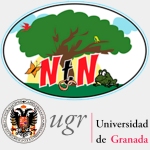Cada semana el programa NtN lleva a cabo una actividad diferente. Cada actividad incluye un “Experimento” que realiza el alumnado de Educación de Primaria bajo la supervisión de mentores (alumnado universitario) y profesorado universitario de diferentes áreas de conocimiento que participan voluntariamente en el programa. Las actividades están diseñadas, desarrolladas y adaptadas al curriculum de quinto y sexto curso de Educación Primaria. El objetivo de todas las actividades es, además de dominar los contenidos curriculares, que el alumnado de Educación Primaria desarrolle habilidades cognitivas relacionadas con el pensamiento científico aplicado a diferentes ámbitos de la vida, ejemplificados en problemas y fenómenos presentes en su vida cotidiana.
Todas las actividades comienzan pidiéndole al alumnado que piense en un problema o un hecho de su vida cotidiana, de su entorno inmediato, relacionado con la actividad, que tendrá que resolver siguiendo procedimientos científicos. A continuación, se le pide que reflexione sobre el problema planteado y adelante hipótesis. Finalmente, se les pide que realicen (supervisados por los mentores) las diferentes acciones manipulativas y observaciones que le permitan comprobar sus hipótesis establecidas inicialmente y, finalmente, emitan sus conclusiones.
El desarrollo de la actividad se detalla en una plantilla (Hoja de trabajo de mentores) que incluye una breve introducción sobre la actividad, la relación de materiales que se necesitan, el procedimiento a seguir por parte de los mentores al implementar el experimento, y, finalmente, la hoja de trabajo del alumnado de Educación Primaria, en la que realiza sus propias anotaciones y cálculos necesarios para completar el experimento con éxito.
Each week the NtN program carries out a different activity. Each activity includes an «experiment» conducted by elementary education students under the supervision of university student mentors and university professors in the areas of social science, mathematics and educational psychology, who participate voluntarily in the program. The activities are designed, developed and adapted to the fifth and sixth years’ curriculum of Primary Education. The objective of all activities is, besides the domain of the curricular knowledge, that primary students develop cognitive skills related to scientific thinking applied to different areas of life and exemplified in problems and phenomena present in their daily lives.
All activities start by asking elementary education students to think of a problem or fact present in their daily lives in their surroundings (related to the activity topic they will have to solve but following scientific procedures. Next, students are asked to reflect on that problem or fact and to come up with a possible hypothesis. Last but not least, the student is asked to perform experiments (supervised by their mentors), where manipulative skills are worked out, and observations are linked to the initial hypothesis in order to accept or reject them and to establish their conclusions.
The whole activity is displayed in a template (mentors’ working sheet), which includes a brief introduction to the theme of the experiment related to the curriculum of the area of knowledge, the list of materials needed, the procedure to be followed by mentors when implementing the experiment, and finally, the worksheet where the students of Elementary Education make their own notes and calculations necessary to complete the experiment successfully.
